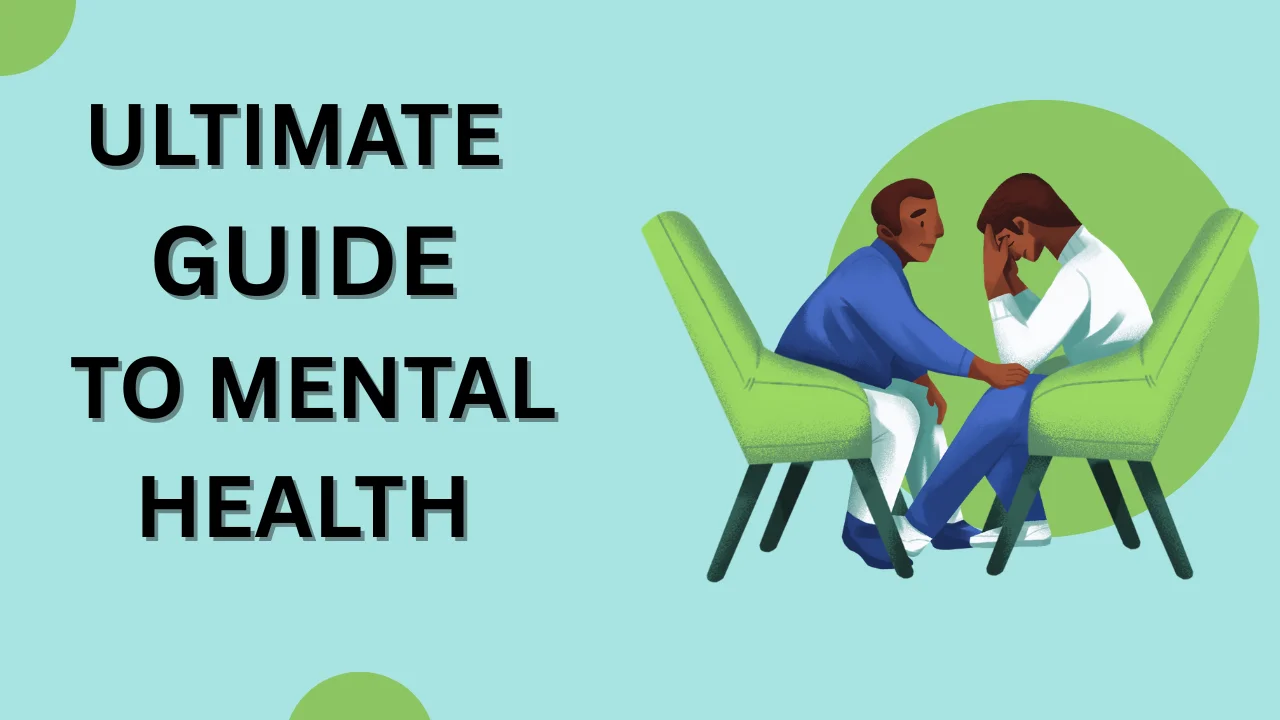Understanding Mental Health
Mental health refers to our emotional, psychological, and social well-being. It affects how we think, feel, and act, as well as how we handle stress, relate to others, and make choices. Just like physical health, mental health is important at every stage of life—from childhood to adulthood.
Good mental health doesn’t mean feeling happy all the time. It means being able to cope with the ups and downs of life, manage emotions, maintain relationships, and function productively in daily life.
Key points about understanding mental health:
- Everyone has mental health, just like everyone has physical health.
- Mental health can fluctuate due to life circumstances, trauma, stress, genetics, or chemical imbalances.
- Seeking help is a sign of strength—not weakness.
- Promoting mental well-being can prevent mental illnesses or reduce their impact.

Common Mental Health Disorders
Mental health disorders (also called mental illnesses) are conditions that affect a person’s thinking, feeling, behavior, or mood. They may be occasional or long-lasting (chronic), and they can impact daily functioning, relationships, and quality of life.
1. Depression
- A mood disorder marked by persistent feelings of sadness, hopelessness, and loss of interest in activities once enjoyed.
- Symptoms may include fatigue, difficulty concentrating, changes in appetite, and suicidal thoughts.
2. Anxiety Disorders
- These include disorders like Generalized Anxiety Disorder (GAD), Panic Disorder, and Social Anxiety Disorder.
- Common symptoms: excessive worry, rapid heartbeat, restlessness, irritability, and trouble sleeping.
3. Bipolar Disorder
- Characterized by extreme mood swings that include emotional highs (mania) and lows (depression).
- During manic phases, individuals may feel euphoric, overly energetic, or impulsive.
4. Obsessive-Compulsive Disorder (OCD)
- Involves unwanted, recurring thoughts (obsessions) and repetitive behaviors (compulsions), like hand-washing or checking things repeatedly.
- These behaviors are often performed to reduce anxiety, even though they interfere with daily life.
5. Post-Traumatic Stress Disorder (PTSD)
- Develops after experiencing or witnessing a traumatic event, such as war, abuse, or a serious accident.
- Symptoms include flashbacks, nightmares, severe anxiety, and emotional numbness.
6. Schizophrenia
- A severe mental disorder that affects how a person thinks, feels, and behaves.
- Symptoms may include hallucinations, delusions, disorganized thinking, and loss of touch with reality.
7. Eating Disorders
- Includes conditions like anorexia nervosa, bulimia nervosa, and binge eating disorder, involving unhealthy relationships with food, body image, and weight.
8. Personality Disorders
- These are long-term patterns of behavior and inner experiences that differ significantly from what’s expected.
- Examples include Borderline Personality Disorder (BPD) and Antisocial Personality Disorder (ASPD).
Signs and Symptoms of Mental Health Issues
Recognizing the signs of mental health problems is important for early intervention and support. Not everyone shows the same symptoms, but there are common warning signs to look out for. These signs may appear gradually or suddenly, and they can affect a person’s thoughts, emotions, and behavior.
Common Emotional and Behavioral Signs:
- Persistent sadness or low mood (lasting more than 2 weeks)
- Excessive worry or fear about everyday situations
- Extreme mood changes – feeling very high (manic) or very low (depressed)
- Withdrawal from social activities, friends, or family
- Irritability or anger outbursts that seem unusual
- Lack of motivation or interest in things once enjoyed
- Difficulty concentrating or making decisions
- Changes in sleeping habits – sleeping too much or too little
- Changes in appetite or weight
- Fatigue or low energy most of the time
- Substance abuse – using alcohol or drugs to cope
- Thoughts of self-harm or suicide (in urgent cases, this requires immediate help)
Physical Symptoms:
- Headaches, stomach aches, or unexplained pain
- Restlessness or feeling “on edge”
- Rapid heartbeat or breathing difficulties (especially in anxiety)
These signs may vary depending on the specific mental health condition, the person’s age, and other life factors. Noticing and talking about these symptoms early can make a big difference.
Mental Health Myths vs. Facts
There are many myths and misunderstandings about mental health. These myths often create stigma and prevent people from seeking the help they need. Let’s clear up some of the most common ones:
Myth 1: Mental illness is a sign of weakness
Fact: Mental illness is not a weakness or character flaw. It is a health condition that can affect anyone, just like heart disease or diabetes.
Myth 2: You can just “snap out of it”
Fact: Mental illnesses are not something a person can simply “get over.” They often require professional treatment, therapy, medication, or lifestyle changes.
Myth 3: People with mental illnesses are violent or dangerous
Fact: Most people with mental health issues are not violent. In fact, they are more likely to be victims of violence than to cause it.
Myth 4: Therapy is only for “crazy” people
Fact: Therapy can help anyone. People go to therapy to deal with stress, grief, relationships, and personal growth—not just mental illness.
Myth 5: Children and teens don’t experience mental health problems
Fact: Kids and teens can suffer from anxiety, depression, ADHD, trauma, and other issues. Early support can prevent long-term struggles.
Myth 6: Once you have a mental illness, you’ll never recover
Fact: Many people recover completely or learn to manage their conditions well. Recovery looks different for everyone, but support and treatment can lead to a fulfilling life.
The Importance of Mental Well-being
Mental well-being is about more than just the absence of mental illness. It means feeling good emotionally, psychologically, and socially. It allows you to cope with life’s challenges, build strong relationships, and lead a fulfilling life.
Just like physical health helps your body function, mental well-being helps your mind function in healthy ways.
Why Mental Well-being Matters:
1. Helps You Cope with Stress
- Life is full of challenges—work pressure, financial issues, relationship problems. Good mental well-being helps you manage stress effectively without feeling overwhelmed.
2. Boosts Your Productivity
- When your mind is healthy, you can focus better, think clearly, make good decisions, and stay motivated. This improves your performance at school, work, or in personal goals.
3. Improves Relationships
- Good mental well-being allows you to communicate better, show empathy, and handle conflicts in a healthy way. This strengthens your connections with friends, family, and co-workers.
4. Supports Physical Health
- Mental and physical health are deeply connected. Poor mental health can lead to poor sleep, eating problems, a weakened immune system, and even heart issues. On the other hand, a healthy mind promotes a healthy body.
5. Increases Life Satisfaction
- When you feel emotionally balanced, you’re more likely to enjoy your daily life, have a sense of purpose, and feel hopeful about the future.
6. Prevents Mental Illness
- Taking care of your mental well-being can reduce the risk of developing anxiety, depression, and other mental health disorders. Prevention is often easier and more effective than treatment later on.
Ways to Improve Your Mental Well-being:
- Practice self-care and relaxation
- Stay connected with others
- Get enough sleep and physical activity
- Talk about your feelings
- Seek help when needed
Therapy and Counseling Options
Therapy and counseling are professional services that help people manage emotional, mental, and psychological challenges. These services are offered by trained mental health professionals such as psychologists, counselors, and therapists.
Types of Therapy:
- Cognitive Behavioral Therapy (CBT): Focuses on changing negative thought patterns and behaviors.
- Dialectical Behavior Therapy (DBT): Helps with emotional regulation and is often used for people with intense emotions or borderline personality disorder.
- Talk Therapy (Psychotherapy): A general form of therapy where individuals talk through their feelings and experiences.
- Group Therapy: A therapist leads a group of people facing similar issues, helping them learn from each other.
- Family or Couples Counseling: Helps improve communication and resolve conflicts in relationships.
Medication and Mental Health
In some cases, mental health conditions may require medication to help manage symptoms. Medications are often used along with therapy, not as a replacement for it.
Common Types of Mental Health Medications:
- Antidepressants: Used to treat depression, anxiety, and certain mood disorders.
- Anti-anxiety medications: Help manage intense anxiety or panic attacks.
- Mood stabilizers: Used for mood disorders like bipolar disorder.
- Antipsychotics: Help treat symptoms of psychosis, schizophrenia, or severe bipolar disorder.
Important Notes:
- Medications should always be prescribed and monitored by a qualified doctor (usually a psychiatrist).
- Every person reacts differently to medications; it might take time to find the right one.
- Medication can be an important part of recovery, especially when symptoms interfere with daily life.
Coping Mechanisms and Strategies
Coping mechanisms are tools and techniques people use to handle stress, difficult emotions, or challenging situations. Healthy coping strategies can help prevent a mental health crisis and promote emotional balance.
Examples of Healthy Coping Strategies:
- Deep breathing or mindfulness exercises
- Physical activity or exercise
- Talking to a friend or therapist
- Writing in a journal
- Listening to music or engaging in creative hobbies
- Taking breaks and resting
- Setting small goals to feel productive
Self-Care for Mental Wellness
Self-care means taking intentional actions to care for your physical, mental, and emotional health. It’s not selfish—it’s necessary.
Examples of Mental Self-Care:
- Get enough sleep
- Eat balanced and nutritious meals
- Exercise regularly
- Spend time with supportive people
- Limit screen time and social media use
- Say “no” when you feel overwhelmed
- Practice gratitude and positive thinking
How to Support a Loved One
Supporting someone with mental health challenges can be difficult, but it’s also incredibly meaningful. Your support can make a big difference in their recovery and well-being.
Ways to Offer Support:
- Listen without judgment – Sometimes people just need someone to hear them.
- Encourage them to seek help – Offer to help them find a therapist or go with them to appointments if needed.
- Educate yourself about their condition so you understand what they’re going through.
- Check in regularly – Even a simple “How are you feeling today?” can mean a lot.
- Be patient – Healing takes time. Avoid pushing them to “get better” quickly.
- Take care of yourself too – Supporting someone else can be emotionally draining. Make sure you’re also practicing self-care.
The Role of Nutrition and Exercise
Nutrition and Mental Health:
What you eat can directly affect how you feel. The brain needs a variety of nutrients to function well. A poor diet can lead to fatigue, poor concentration, and increased risk of anxiety and depression.
Helpful nutrition tips for mental well-being:
- Eat balanced meals with whole grains, lean proteins, fruits, and vegetables.
- Include foods rich in omega-3 fatty acids (like fish and flaxseeds) for brain health.
- Stay hydrated—dehydration can affect your mood and focus.
- Avoid too much caffeine, sugar, or processed foods, which can cause mood swings.
Exercise and Mental Health:
Physical activity boosts your mood by increasing the release of endorphins—chemicals in the brain that reduce pain and create a feeling of happiness.
Benefits of regular exercise:
- Reduces symptoms of depression and anxiety
- Improves sleep quality
- Builds self-esteem and confidence
- Helps manage stress
Sleep and Mental Health
Sleep is essential for both your body and your mind to recharge. Lack of sleep can worsen mental health problems like anxiety, depression, and irritability. On the other hand, mental health conditions can also make it harder to sleep—creating a cycle.
Tips for better sleep:
- Stick to a regular sleep schedule (even on weekends)
- Avoid screens at least 30 minutes before bedtime
- Create a calming nighttime routine (reading, meditation, or soft music)
- Avoid heavy meals, caffeine, and alcohol before bed
- Keep your sleep environment dark, cool, and quiet
Mindfulness means paying full attention to the present moment—without judgment. It helps you become more aware of your thoughts and emotions, making it easier to manage them.
Mindfulness and Meditation Practices
Meditation is one way to practice mindfulness. It involves focusing your attention (often on your breath) to create a calm and peaceful state of mind.
Benefits of mindfulness and meditation:
- Reduces stress and anxiety
- Improves focus and emotional regulation
- Helps with self-awareness
- Promotes a sense of calm and clarity
Setting Boundaries and Managing Stress
Setting Boundaries:
Boundaries are limits you set to protect your mental and emotional well-being. They help you say “no” when necessary, maintain healthy relationships, and avoid burnout.
Examples:
- Saying no to extra work when you’re already overwhelmed
- Limiting time with negative or toxic people
- Taking breaks from social media or phone calls
Managing Stress:
Stress is a normal part of life, but when it becomes overwhelming, it affects your mental and physical health.
Healthy ways to manage stress:
- Practice deep breathing or meditation
- Take regular breaks and get outside
- Stay organized with a planner or to-do list
- Talk to someone you trust
- Do something fun or creative
Building Resilience
Resilience is the ability to bounce back from difficulties, adapt to change, and keep going even when life gets tough. It doesn’t mean you never feel sad or stressed—it means you don’t let those emotions define or defeat you.
Ways to build resilience:
- Develop a positive mindset – focus on what you can control
- Learn from challenges – see setbacks as opportunities for growth
- Stay connected – build strong, supportive relationships
- Take care of your body – eat well, sleep, and stay active
- Ask for help – know when to seek support from others or professionals




Pingback: Enhancing Gut Health: Practical Steps For A Balanced Microbiome